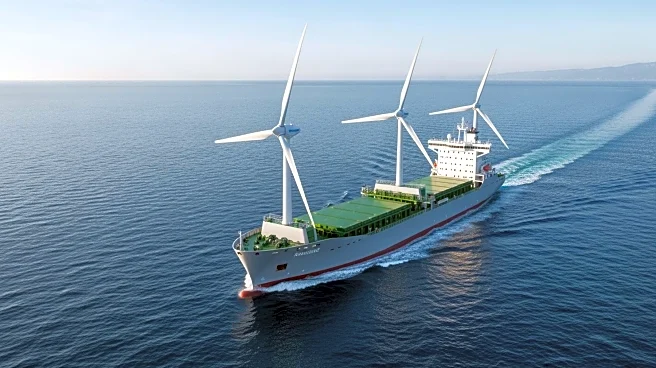What's Happening?
The International Maritime Organization (IMO) is holding an Extraordinary Session of the Marine Environment Protection Committee (MEPC) to discuss the adoption of the Greenhouse Fuel Index (GFI), a measure
aimed at aligning global shipping practices with net zero emissions goals by 2050. Shipping, responsible for 90% of global trade, contributes approximately 3% of the world's greenhouse gas emissions. The session is considering wind propulsion as a cornerstone technology to reduce emissions significantly. Wind propulsion can decrease fuel consumption and emissions by 5-25%, and up to 70% in favorable conditions. The International Wind Shipping Association (IWSA) advocates for the inclusion of wind propulsion in regulatory frameworks, emphasizing its potential to lower energy costs while improving GFI scores.
Why It's Important?
The discussions at the IMO are crucial for the shipping industry, which faces increasing pressure to reduce its carbon footprint. The adoption of wind propulsion technology could lead to significant environmental benefits, reducing reliance on fossil fuels and cutting emissions. This shift could also drive investment in sustainable practices and technologies, potentially transforming the industry. Shipowners and operators are recognizing wind propulsion as a viable, class-approved technology, which could lead to widespread adoption and compliance with international environmental standards. The outcome of the IMO meeting could set a precedent for future regulatory and incentive mechanisms in the shipping sector.
What's Next?
As the MEPC session progresses, stakeholders in the shipping industry are expected to continue advocating for the integration of wind propulsion into the IMO's Net-Zero Framework. The recognition of wind propulsion as a key technology could accelerate its adoption, prompting shipowners to invest in this sustainable solution. The IMO's decision could influence global shipping practices, encouraging other sectors to explore similar technologies for reducing emissions. The industry will be watching closely to see how the IMO's decisions impact regulatory compliance and investment in green technologies.
Beyond the Headlines
The potential adoption of wind propulsion technology by the IMO could have broader implications for global trade and environmental policy. It may encourage other industries to explore renewable energy sources and sustainable practices, contributing to a larger shift towards decarbonization. The move could also influence public perception of the shipping industry, positioning it as a leader in environmental responsibility. Long-term, this could lead to increased collaboration between governments, industry leaders, and environmental organizations to address climate change.









